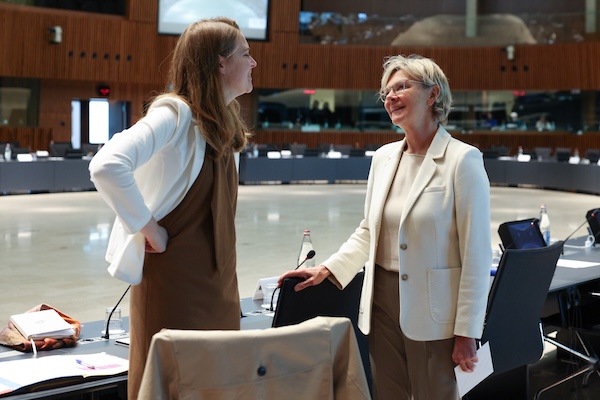 (L-R) Anne-Catherine Dalcq, Minister of Agriculture and Rural Affairs, Wallonia, Kingdom of Belgium; Martine Hansen, Luxembourg Minister of Agriculture, Food and Viticulture;
Credit: Alexandros MICHAILIDIS
(L-R) Anne-Catherine Dalcq, Minister of Agriculture and Rural Affairs, Wallonia, Kingdom of Belgium; Martine Hansen, Luxembourg Minister of Agriculture, Food and Viticulture;
Credit: Alexandros MICHAILIDIS
On Monday 27 October 2025, Luxembourg Minister for Agriculture, Food and Viticulture, Martine Hansen, took part in the European Union’s “Agriculture and Fisheries” Council, in Luxembourg-Kirchberg.
According to the Ministry for Agriculture, Food and Viticulture the proposal concerning the Common Agricultural Policy (CAP) after 2027 was at the centre of discussions.
Minister Hansen said: “We are here to support our farmers and to strengthen the CAP. I remain convinced that all elements related to the CAP should be brought together in a single text, and that all key legislative components linked to the CAP should be negotiated within the Council of Ministers for Agriculture.”
She added: “The reduction in the future national budgetary envelope dedicated to the CAP is striking, while we are being asked to provide even more measures for farmers – a situation that is difficult to reconcile.”
The ministry reported that the ministers held an orientation debate on the ecological architecture, with the objective of making the green transition simpler and more attractive for farmers while ensuring fair competition conditions. According to Minister Hansen, the new concept of sustainable agricultural management proposed by the Commission must be further simplified, taking into account the specific situation in the different Member States.
Regarding the introduction of an environmental transition action plan to be established by each farmer, the Minister considers this an interesting complement to other agri-environmental measures.
In relation to generational renewal and support for young farmers, the ministry noted: “These are absolute common priorities for both the European Commission and Luxembourg”. Minister Hansen welcomed the idea of a separate and dedicated strategy for young farmers within the framework of the next programming period. She stated: “In Luxembourg, the main challenge lies in access to land and to financial instruments suited to the needs of young farmers. Technical and legal advice is another key aspect of this strategy. In Luxembourg, we are considering setting up a one-stop shop to guide young people throughout the implementation of their establishment plan.”
With regard to the Deforestation Regulation, Minister Hansen expressed her reservations about the Commission’s new simplification proposal, “which is not yet mature and contradicts the promises made by the Commissioner. We are calling for substantial simplifications for countries not affected by deforestation and wish to avoid unnecessary new administrative burdens for producers.”
During discussions on agricultural markets and trade relations with Ukraine, attended by the Deputy Prime Minister of Ukraine, Taras Kachka, Minister Hansen expressed her full solidarity with Ukraine and remarked: “The progressive integration of Ukraine into the European market must take place in a balanced manner while protecting the interests of European producers.”
From an economic standpoint, the minister noted that profit margins for cereal harvests remain too low for European producers, “which makes CAP support absolutely essential to cushion market fluctuations,” and that the wine sector is also under strong pressure due to declining wine consumption, making it important to finally finalise the wine package to send a positive signal to winegrowers.
Moreover, faced with the rise of animal diseases, the minister called for coordination at European level to safeguard livestock health. In this context, Germany informed Member States about the spread of avian influenza in eight states and that Luxembourg is also affected.
The ministry added that on the sidelines of the Council, Minister Hansen held a bilateral meeting with Commissioner Christophe Hansen to discuss the CAP after 2027.








